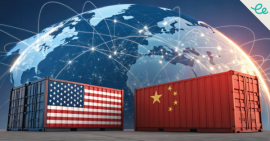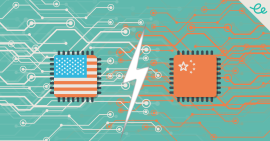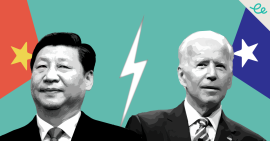The coronavirus pandemic has worsened already badly frayed China US relations. “This is worse than Pearl Harbor” or 9/11, President Trump said of America’s “worst attack”, that “could have been stopped in China.” “We could cut off the whole relationship,” he later threatened. Beijing aimed most fire at Secretary of State Pompeo, who changed tack to admit Covid-19 may not have come from a Wuhan lab. This article is a summary of important China US news in May 2020.
Beijing’s new security law means Hong Kong no longer warrants special treatment under US law, declared Pompeo, and Trump could within days issue an executive order on wide-ranging economic penalties against Hong Kong and China. The US House of Representatives approved legislation calling for sanctions on Chinese officials responsible for oppression of Uighur Muslims.
In the latest push towards financial decoupling, the US Senate passed a bill that could force some Chinese companies to de-list from US exchanges. Baidu, China’s leading search engine, is now considering its options over its Nasdaq listing. London may benefit, as China resumes vetting applications by companies seeking to list there.
A new White House strategy paper on China accused the PRC of posing “numerous challenges to United States national interests.” The tech cold war continued, with China finalising a new US$1.4tn plan to seize the world’s tech crown from the USA. Huawei CFO Meng Wanzhou lost a Canadian court fight in her battle to avoid extradition to the USA.
US senators promised legislation to impose sanctions on Chinese officials for violating Hong Kong’s independence. In a sign of phase one trade deal progress, Beijing approved a wider range of American agricultural products for import. China has actually been increasing purchases of US soybeans, and other farm goods, but decoupling continued as Trump extended an executive order aimed at Huawei to guard the US telecoms supply chain and moved a federal employees’ fund away from investing in Chinese stocks.
The PLA expelled a US warship that “trespassed into Chinese territorial waters off the Xisha Islands,” said China, whose top defence official warned that strategic confrontation has entered a high-risk period. China’s foreign minister defended its combative “wolf warrior” diplomacy. China must strengthen its nuclear arsenal, experts told the Global Times. “Over the past decade, in US war games against China, the United States has a nearly perfect record: We have lost almost every single time,” warned a new book.
The CIA believes China tried to prevent the WHO from sounding the alarm on the outbreak in January, reported Newsweek. China’s state media called out US “tricks” to shift blame onto China.
Trump threatened to terminate the phase one trade deal if China fails to fulfil its promise to buy US$200bn more in American goods and services. The White House and Capitol Hill look to match anti-Beijing rhetoric with steps to curb supply chains and investment flows, reported the FT. But top trade negotiators spoke, vowing to continue to support the deal.
The US is rearming – with new weapons and strategy – to counter China’s advantage in land-based cruise and ballistic missiles. China’s new generation supersonic stealth bomber – expected to double the country’s strike range – could debut in November. Deputy National Security Advisor Matt Pottinger gave a provocative speech in Chinese praising the heirs of China’s May Fourth 1919 pro-democracy movement in China, namely Li Wenliang, the Covid-19 whistle-blower and victim. The Foreign Ministry said Pottinger was wrong and should mind his own business.









Comments are closed.